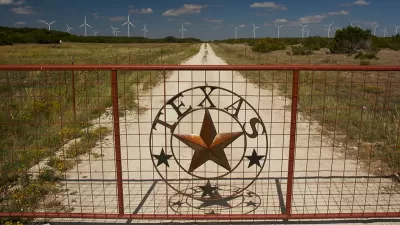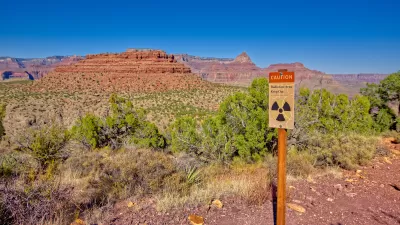As renewable energy production grows in Republican-leaning states, lawmakers are becoming less resistant to supporting clean energy policies.

“I don’t want to be naïve or to echo the predictions of previous climate Pollyannas to say that Republican cooperation is right around the corner,” writes David Wallace-Wells in The New York Times about federal efforts to promote renewable and clean energy. “But the partisan landscape may be finally changing, indeed somewhat significantly.”
For proof, Wallace-Wells points to the relatively painless adoption of the Inflation Reduction Act, “The biggest piece of climate legislation in American history,” which met with much less backlash from Republican lawmakers than other progressive legislation.
“One big reason for that is the design of the bill itself, which was both smaller in size and more targeted in scope than many of the original Green New Deal proposals. In fact, it was designed in part to blunt backlash” by largely offering incentives rather than penalties and pumping billions of dollars into local economies in ‘red’ areas, where renewable energy production is booming. “All told, according to an analysis by the Rocky Mountain Institute, the Inflation Reduction Act could deliver, on average, nearly twice as much subsidy per capita to Republican states as Democratic ones.”
Ultimately, Wallace-Wells believes the contribution to local economies will likely win over ideology. “When the government is pouring money into your backyard, it’s hard to play the NIMBY for long.”
FULL STORY: Clean Energy Is Suddenly Less Polarizing Than You Think

Planetizen Federal Action Tracker
A weekly monitor of how Trump’s orders and actions are impacting planners and planning in America.

Restaurant Patios Were a Pandemic Win — Why Were They so Hard to Keep?
Social distancing requirements and changes in travel patterns prompted cities to pilot new uses for street and sidewalk space. Then it got complicated.

Map: Where Senate Republicans Want to Sell Your Public Lands
For public land advocates, the Senate Republicans’ proposal to sell millions of acres of public land in the West is “the biggest fight of their careers.”

Maui's Vacation Rental Debate Turns Ugly
Verbal attacks, misinformation campaigns and fistfights plague a high-stakes debate to convert thousands of vacation rentals into long-term housing.

San Francisco Suspends Traffic Calming Amidst Record Deaths
Citing “a challenging fiscal landscape,” the city will cease the program on the heels of 42 traffic deaths, including 24 pedestrians.

California Homeless Arrests, Citations Spike After Ruling
An investigation reveals that anti-homeless actions increased up to 500% after Grants Pass v. Johnson — even in cities claiming no policy change.
Urban Design for Planners 1: Software Tools
This six-course series explores essential urban design concepts using open source software and equips planners with the tools they need to participate fully in the urban design process.
Planning for Universal Design
Learn the tools for implementing Universal Design in planning regulations.
Heyer Gruel & Associates PA
JM Goldson LLC
Custer County Colorado
City of Camden Redevelopment Agency
City of Astoria
Transportation Research & Education Center (TREC) at Portland State University
Camden Redevelopment Agency
City of Claremont
Municipality of Princeton (NJ)





























